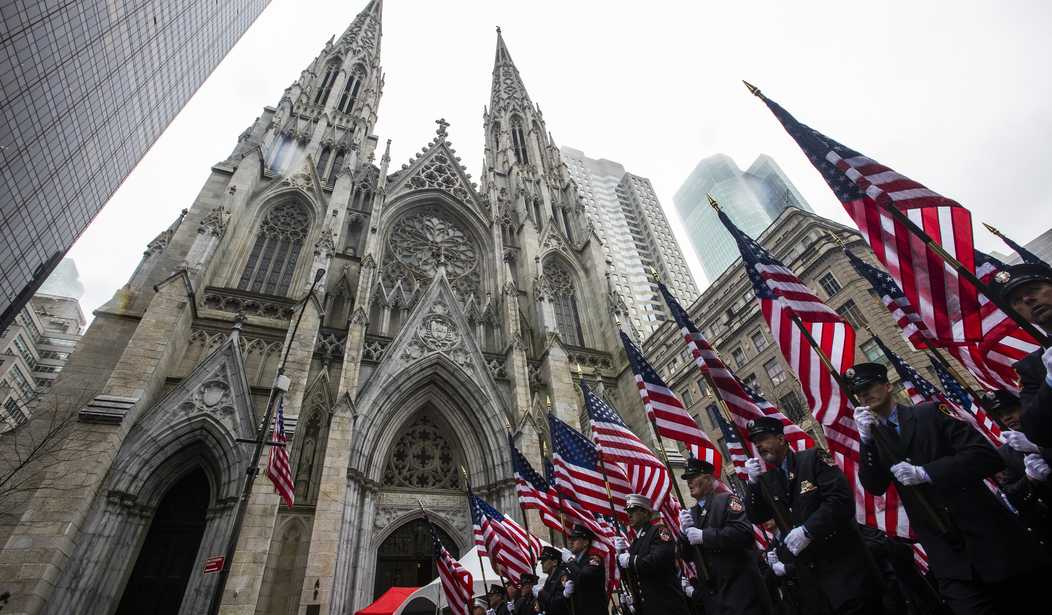At this year's Chrism Mass -- in which holy oils are blessed and the priesthood is celebrated -- at St. Patrick's Cathedral in New York, Cardinal Timothy Dolan chose not to preach. Instead, he gave the pulpit to Archbishop Borys Gudziak, the Metropolitan Archbishop of Philadelphia for the Ukrainian Greek Catholic Church. Before Gudziak said a word, the message was clear: He represents a people who are united with Jesus in suffering. But Gudziak didn't begin there. He began with gratitude -- for the Eucharist, for the priesthood and for the people in the United States who have demonstrated "incredible" support for the persecuted in Ukraine.
Gudziak thanked his audience, in person and remote, for their prayers. Often, we think there is nothing we can do, but if we are people of prayer, then prayers are meaningful action. We can lend our support in material ways as well, but don't forget the powerful work of prayer, which helps our own souls as much as it does the souls of those we pray for.
It "has been a Lent and Holy Week like no other," Gudziak said. "We ask why. Why this injustice? Why this suffering? Why this craven cruelty?" And yet, he pointed to the hope of the Ukrainians and, indeed, of all Christians, who believe in the miracle of the resurrection, in the idea that death is not the end. Gudziak said: "At the same time, embraced by you, anointed by the Lord, through the gifts of the Holy Spirit, we claim our brotherhood and our sisterhood with Jesus. We recognize ourselves as children of the Father. And we live with hope."
He added, with a tone of confidence that I hope is not misplaced: "I know the people of New York will open their arms and homes (to the displaced)."
He said of Ukrainian Christians: "We live with hope, because we see brothers and sisters loving in the highest way. There is no greater love than when one gives one's life for one's friends. And this love manifested so directly today in Ukraine inspires us all, in the country and globally."
Recommended
Of the example that Easter can provide, he said: "People are walking the path of Jesus. A nation is following the example of Christ. And the world is inspired." Obviously, not everyone -- including Ukrainian President Volodymyr Zelenskyy -- is Christian. But there is a solidarity in suffering and hope that is certainly in line with the message of Jesus. It is a challenge for those who are Christian to rise to the occasion in continuing and enduring ways.
And not just for the people of Ukraine. In the Middle East and Africa, Christians are increasingly coming under threat from terrorist groups. And yet they continue to live their faith in joyful and inspiring ways, even knowing that doing so might put them in mortal danger. Something to think about when we complain about conditions here in the United States.
At St. Vincent Ferrer Church in Manhattan on Holy Thursday, the preacher relayed a story of people in Belarus visited by a priest for the first time in 60 years. They could not have the sacraments without a priest, and so to encounter God's mercy, they would go to a cemetery and whisper their sins to a deceased priest. What a reverence for a faith that continues to strengthen people in their distress. At a time when the importance of organized religion in the United States is so underrecognized by the secular culture and powers-that-be, this news from Belarus serves as a potent reminder.
As we go about our "normal," remember the people for whom normal is persecution. And be inspired, too. Suffering and death will never have the final word.
(Kathryn Jean Lopez is senior fellow at the National Review Institute, editor-at-large of National Review magazine and author of the new book "A Year With the Mystics: Visionary Wisdom for Daily Living." She is also chair of Cardinal Dolan's pro-life commission in New York. She can be contacted at klopez@nationalreview.com.)

























Join the conversation as a VIP Member